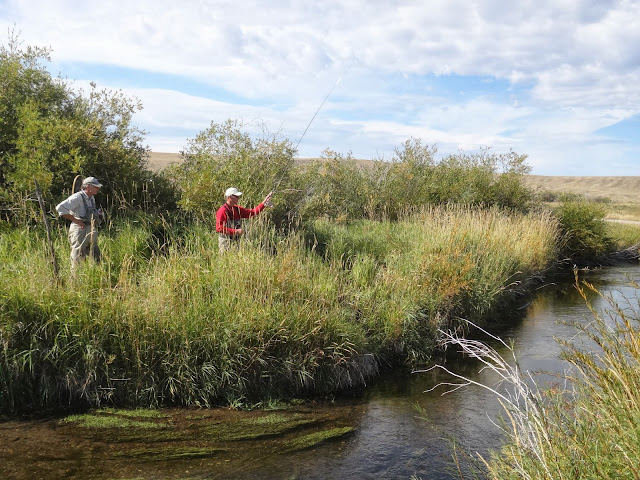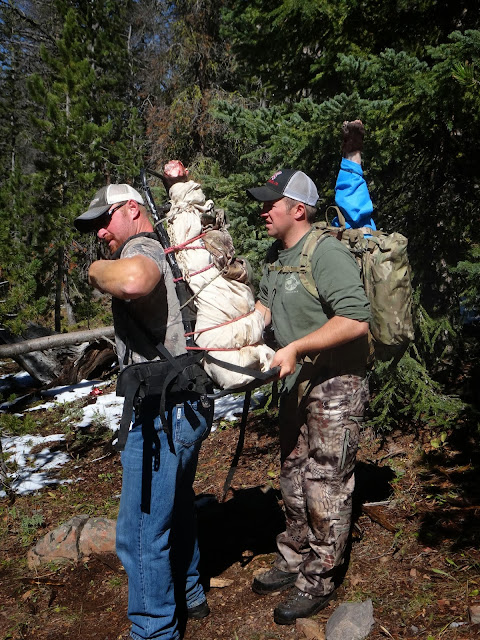I just got back from Montana a couple of days ago and have
been going thru my photos and thought I would share some of them. There were ten D&H anglers for the second
week this year. The experience levels of
our group were new-to-the-sport to seasoned angler.
The reports before we left Cincinnati were that Montana had
low water levels and the fishing was off.
The reason I like the area that D&H visits each September is because
of the variety of water. If the reports
for the West are for low water, high water or just about anything…we always
have options. This year we were told
that the water table was the lowest they have seen in anyone’s memory.
The first day we went to the Lower Ruby valley and fished on
a private ranch that included over sixteen miles of the Ruby and many miles of
Mill Creek. The creek had so many
serpentine curves that you could fish all morning and not be more than a short
walk to get back to the truck for lunch.
This worked out great with a group of four anglers as two headed
downstream and two head up and we met for a midday break. The banks had high grass and sometimes small
trees and made casting challenging at times, but the fishing was great and
everyone including the guides said this was some of their favorite water in the
area. One of our guides said that they
have just scratched the surface of exploring all the water on this ranch and
that we saw only a very small portion of the water. Fishing was great on the creek and some of
our anglers walked over to the Ruby and had good luck there as well. We took a break for lunch and as the guide
was setting out the food he was eyeing the sky and said that the storm would
hit us in three minutes. I thought the
system was going to miss us and slide to the east, but he said it was going to
bounce off the mountains and come right for us.
The guide was correct and we grabbed the food and jumped in the
trucks. The rain and hail pounded the
valley and we sat in the trucks and ate lunch.
As we were finishing lunch the rain stopped and we got out and fished
the rest of the day.
This was typical of the weather our entire trip. We were never shut down and it did not ruin
our fishing, but the mountains gave us all types of weather: cold, warm, rain,
hail and snow in the high elevations.
Layers and good gear were used and tested. You knew pretty soon whether or not you had
the best gear for the job or not.
The one thing I noticed this year is that my large
Stimulator and Para-Illegal patterns that are always the go to flies in years
past seemed to be too large this year. A
size 16 Elk Hair Caddis worked better and smaller bead head buggers were my go
to flies. I had a six dozen fish day on
the Upper Ruby using buggers 80% of the time.
I noticed that the fish taken on buggers were more aggressive and larger
in length and in the body that most of the fish taken on top. I like to hit the bank and strip fast and
this is when I got my hard hits. I like
nothing better than to see a fish push water to attack a fly.
The ranch where we stay is also an elk hunting camp this
time of year and one of our fly fishing guide’s father got an elk on
Thursday. The rancher said that the
terrain was too tough to get in his mules and horses to pack out the elk and so
it would have to be done with a different sort of beast-of-burden. I volunteered to help and so six of us set
out Friday morning to retrieve the elk.
We took two four wheel drive buggies on a dirt road nine miles to the
base of the mountains. On the way, one
of the buggies had a flat tire so everyone piled into one of the buggies. We hiked up a fairly nice trail that turned
to switchbacks and then disappeared.
Towards the end of the hike we were walking thru snow and had to stop
frequently to rest as the elevation was high and we were winded. The head guide did a great job of getting us
to the elk without the use of any directional devices. The guides walked into the kill area with
pistols and bear spray at the ready.
Luckily there were no four legged furry creatures hanging around when we
got there. We took a break for lunch and
water and then the guides started to skin the kill and separate and pack the
animal for transport on pack frames. The
hike down the mountain was less tiring, but the terrain was steep and you had
to look at the ground the entire time to ensure good footing.
I was wearing Patagonia Capilene 2 long sleeve crew neck
against my skin and a Capilene 3 zip neck over the Cap 2. This was the perfect combination as the Capilene
moved the sweat off of my skin and gave me some warmth from the cool mountain
air. It is not often when you get to
truly test your gear and I was happy to experience the gear D&H sells
working as I expected. The other gear I
was wearing was a pair of Mountain Khaki Original pants for going thru the
brush, Fox River midweight merino wool socks for a no blister comfortable hike,
Columbia hiking boots that were great and a D&H ball cap for blocking out
the sun in style. I had a Swiss Army
stainless steel Swisstool on my belt just in case hanging from my sturdy Filson
leather belt. Probably one of the most
important parts of this outfit was the Patagonia briefs. Patagonia told me this is the style that the
guys that do the running, biking and swimming marathons wear and they have
always worked for me for bird hunting and manual labor.

























No comments:
Post a Comment